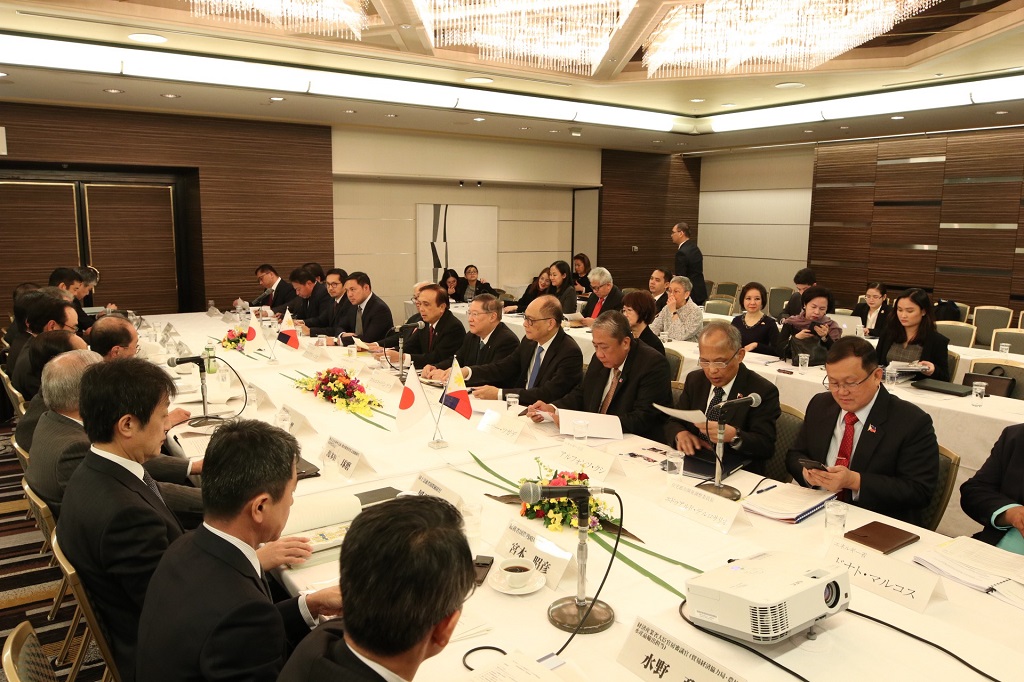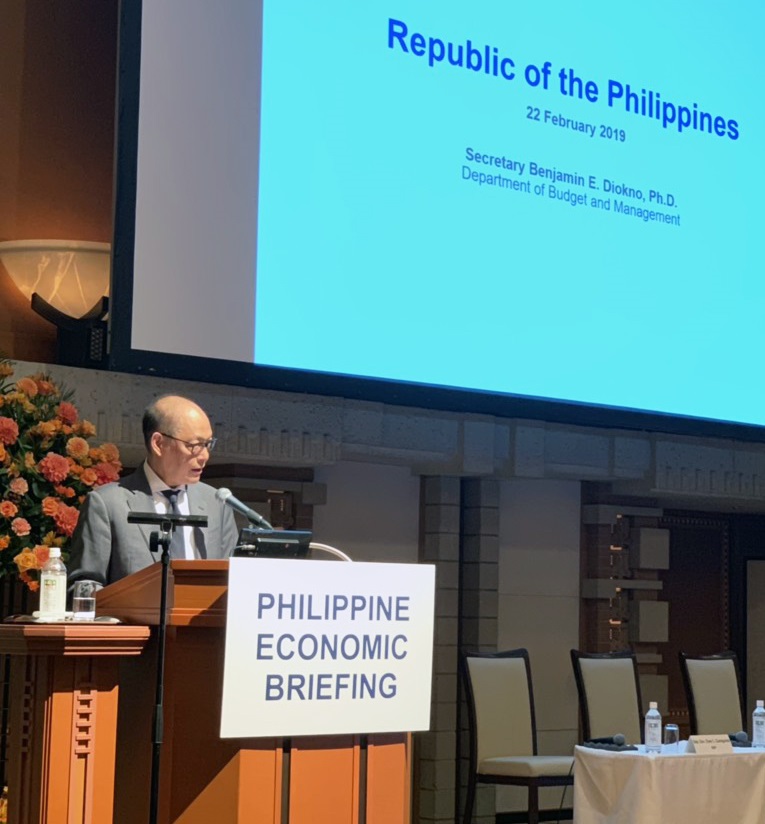
Budget and Management Secretary Benjamin Diokno participates in the 7th Philippines-Japan High Level Joint Committee Meeting on Infrastructure Development and Economic Cooperation.
He is seated next to Finance Secretary Carlos Dominguez who leads the Philippine delegation.
On February 21, 2019, Budget and Management Secretary Benjamin Diokno together with Finance Secretary Carlos Dominguez, National Economic and Development Authority Director-General Ernesto Pernia and other key Cabinet officials participated in the 7th Philippines-Japan High Level Joint Committee Meeting on Infrastructure Development and Economic Cooperation held in Osaka, Japan.
The Japanese delegation included the Special Adviser to the Cabinet Mr. Shigeru Kiyama; Special Adviser to the Prime Minister Mr. Hiroto Izumi; Ambassador of Japan to the Philippines Koji Haneda; representatives from the Japan International Cooperation Agency, Japan Bank for International Cooperation; and other institutions.
Priorities discussed at the bilateral meeting were infrastructure cooperation, the peace process and socio-economic development in Mindanao, and sectoral cooperation.
The Philippine delegation explained that the country was making headway with the implementation of infrastructure projects such as the New Mactan Bridge Construction Project, New Clark City, and Phase 1 of the Metro Manila Subway Project, among others.
Advances in the Bangsamoro plebiscite, the road network development project in conflict affected areas in Mindanao, the rehabilitation and reconstruction of Marawi City and its surrounding areas, and other developments based in Mindanao were also shared by the Philippine delegation.
Moreover, updates and plans of action were exchanged between the Philippine and Japanese delegations with regard to regional development, information and communications technology, energy, agriculture, public safety, healthcare, disaster prevention, and the environment. Both sides vowed to continue their bilateral cooperation in these areas.
“The contribution of Japan is crucial for the continued progress of the Philippines“ Secretary Diokno said. “With their knowledge and expertise, the country will be able to build and maintain the state-of-the-art infrastructure that the Filipino people need for interconnectivity,“ he added.
Philippine Economic Briefing Osaka

Secretary Diokno starts his presentation on the Duterte administration’s fiscal strategy and priorities at the Philippine Economic Briefing in Osaka.
Budget and Management Secretary Benjamin Diokno spoke on the Duterte administration’s fiscal strategy and priorities at the Philippine Economic Briefing in Osaka.
Other speakers in the briefing were Ambassador of the Philippines to Japan Jose Laurel V, Finance Secretary Carlos Dominguez, Bangko Sentral ng Pilipinas Deputy Governor Diwa Guinigundo, and Transportation Secretary Arthur Tugade.
Organized by the Investor Relations Office of the Bangko Sentral ng Pilipinas (BSP-IRO), the Philippine Economic Briefing aims to inform businessmen and investors based in Osaka of the country’s economic position and prospects for growth.
“Spurring the Philippine economy is the expansionary fiscal program… our medium term fiscal plan is prudent, sustainable, and supportive of development goals as it bolsters the country’s economic activity” Diokno said.
The budget secretary highlighted social services expenditures, which peaked at 40.3% of the national budget in 2017, the first full year of President Duterte. This level of social services spending was sustained in 2018 at 37.8%.
“The Philippines has a young and growing population, whose median age is 24 years old. In an aging world, this is a formidable asset. Hence, we plan to mold the youth into an educated, healthy, and competent workforce” the budget secretary said. “In 2019, we will sustain spending for social services at 36.7% of the national budget.” he added.
Besides investment in human capital, Diokno also discussed infrastructure spending, the next top priority of the Duterte administration.
“For the last 50 years, before the Duterte administration, the Philippines has spent the equivalent of 2.6% of GDP for public infrastructure. By any standard, this level is dismal” the budget chief asserted.
“In 2017, we launched the Build Build Build program, which will usher in the Golden Age of Infrastructure with the construction of roads, bridges, airports, and railways all across the country. By 2022, infrastructure spending will be about 7% of GDP,” he added.
Secretary Diokno also discussed the budget reforms being implemented by the Department of Budget and Management (DBM), specifically annual cash budgeting, the Budget and Treasury Management System (BTMS), and Project DIME (Digital Imaging for Monitoring and Evaluation).
(30)

